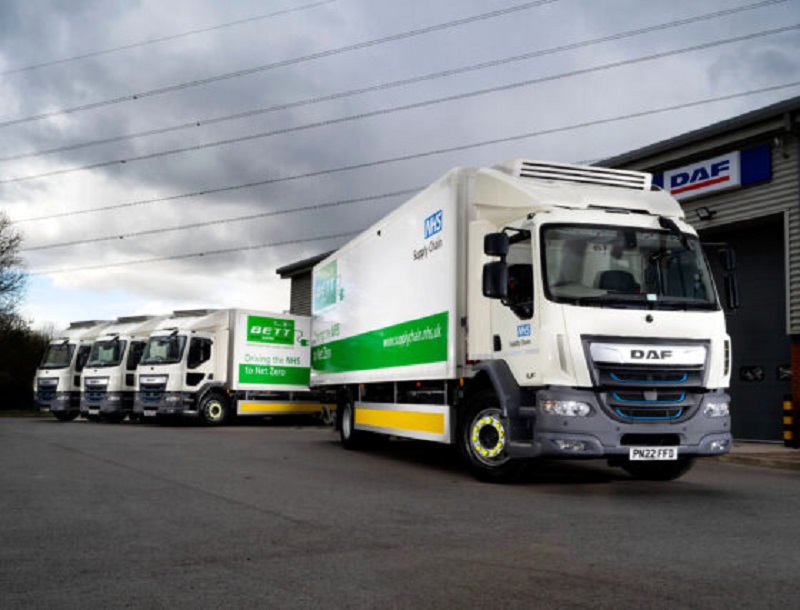The NHS is continuing its carbon reduction efforts with the introduction of electric trucks and rapid response emergency cars.
NHS Supply Chain, in partnership with its logistics provider, Unipart Logistics, is one of the key operators taking part in a 12-month pilot project which is seeing 20 DAF LF Electric trucks entering service with the NHS and local authorities.
The fleet of eight fully-electric trucks, built by Leyland Trucks, will deliver medical consumable products to hospitals as part of the Department for Transport’s £10m Battery Electric Truck Trial (BETT).
The BETT focuses on vehicles, charging infrastructure, user training, repair and maintenance, and total cost of ownership, providing operational insight across a variety of duty cycles.
It is part of the Government’s wider £20m zero-emission road freight trials and is delivered using the Small Business Research Initiative, a process bringing together government challenges and ideas from business to create innovative solutions.
NHS Supply Chain’s director of supply chain, Chris Holmes, said: “It is really exciting to be part of one of the largest and most-significant deployments of zero-emission heavy goods vehicles in the UK to date.
“Everything on our zero emission vehicles is electric, even the refrigeration units.
“Driving down our carbon emissions is one of our top priorities and this is just one of the ways we’re supporting the NHS to achieve its net-zero target by 2045, which has wide ranging health benefits for us all, not least around air quality.”

NHS Supply Chain is launching a fleet of eight electric trucks
Claire Salmon, Unipart Logistics’ NHS Supply Chain director, added: “We are excited to be working with our customer NHS Supply Chain to run the Battery Electric Truck Trial, which also supports the Unipart UN Race To Zero commitment to be carbon neutral by 2030 and net zero by 2050.
“The trial will provide us with valuable insight into operating fully-electric vehicles of this size as part of our fleet so we can understand how best to facilitate a charging network, driver training, and the potential to grow this technology in the future.”
The trucks have entered day-to-day operations while at the same time gathering real-time performance data; the results from which will be used in an interactive website to inform future fleet operator buying decisions and help stimulate the sale of battery electric trucks.
Two of the trucks will also be used by The Northern Care Alliance (NCA), an NHS trust which runs hospitals and health services in Oldham, Bury, Rochdale, and Salford.
The state-of-the-art 19-tonne HGVs will be used to transport essential supplies, equipment, and laundry between Salford Royal, Fairfield General, Royal Oldham and Rochdale Infirmary.
NCA chief executive, Dr Owen Williams OBE, said: “We’re incredibly excited to be part of this pilot to try new things and discover what these technologies can do for us, as well as move us away from high levels of emissions being brought through our sites and neighbouring communities every day, towards a much-cleaner, greener solution that will benefit not only our patients but our staff, visitors, and local communities too.
“It’s not just the environmental impact that matters, these plans, technologies, and trials work to deliver improved patient care, save lives, improve lives, and reduce costs and waste.”
The news comes in the same week that the UK ambulance service announced it was trialling electric rapid response cars in its fleet for the first time.
Three electric vehicles joined the East of England Ambulance Service NHS Trust (EEAST) last month for the start of a two-year trial to learn more about how they can be used to best effect.
They include two Skoda Enyaq iV 80x vehicles, which will be used as rapid response cars, attending urgent calls such as cardiac arrests.
The third vehicle is a Vauxhall Vivaro-E van which will be trialled in various roles, including as a falls response vehicle and as a mental health response vehicle.
Tom Abell, chief executive of the trust, said the new electric rapid response cars are ‘much faster’ than their diesel equivalents, going from 0-60mph in around six seconds – half the time it takes a diesel equivalent.
And they can be charged to 80% in around 30 minutes using the quickest charger.
“Clearly the challenge with it is going to be range, but actually in terms of their general performance actually they are superior in many ways and they’re zero emission, which is fantastic,” said Abell.
He added that the trial will help the service learn what the range of the vehicles will be in practice – how far they can be driven before needing to be plugged in and recharged.
He said: “The East of England is a very-diverse geographical area. We know that this technology works very well in urban areas and cities, but we need to look at how it will work in more-rural communities and what is the charging infrastructure and the ways of working that we’re going to need to put in place in order to be able to support this technology moving forward.”
An NHS England grant of £250,000 is helping to fund the trial, including paying for new charging infrastructure.
And the ambulance service is installing chargers at its hub sites – big sites across the patch – and is looking to roll it out to smaller stations.
It also has a payment card system that allows charging at commercial charging sites.
“The way we work clearly is that we go in and out of hospitals and as part of that our crews will be checking in at stations along the way,” said Abell.
“If we can get the right technology and the right infrastructure in place, that should mean we will be able to keep the vehicles on the road and maximise their up time.”
Introducing electric vehicles to the NHS fleet is part of the health service’s pledge to achieve net-zero carbon by 2045.
